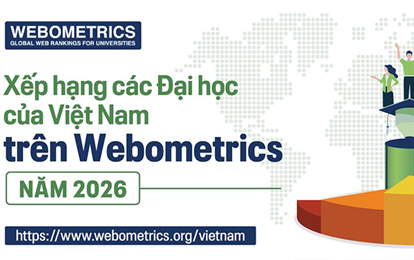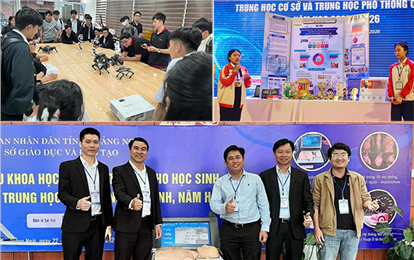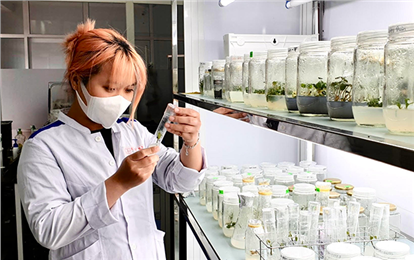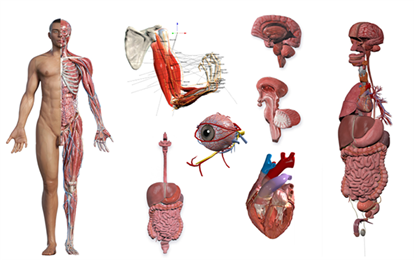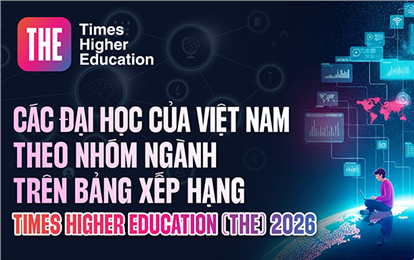Undergraduate
Nationwide Workshop about Teaching, Books, and Resources for Mathematics
Known as a fundamental science that equips us with knowledge and trains our reasoning, Mathematics is a tool for analyzing and researching socioeconomic issues, for boosting the development of the country. However, its importance seems to be declining as many universities, especially in economics, are doing away with Mathematics or are reducing the number of credits devoted to it. In order to affirm the special role of Mathematics and at the same time to find a new orientation in renovating contents, curricula, materials, and teaching methods in Mathematics, DTU coordinated with the Vietnam Institute for Advanced Study in Mathematics (VIASM) to organize the workshop entitled “Teaching, Books, and Resources for Mathematics in Economics, Finance, and Banking”. The workshop is framed in the 2010-2020 National Key Points Program for the Development of Mathematics.

Speaking at the Workshop, Professor. Bui Van Ga, Deputy-Minister of Education and Training, said: “The current reductions in time spent teaching Mathematics in several fields such as medicine, social sciences, management, and even engineering and technology, are worrying employers about the capabilities and the basic knowledge of students, about their capacity to adapt to a rapidly changing work environment. As society becomes more developed, people’s logical thinking increases. Therefore, the teaching of Mathematics at school must be enhanced, each discipline getting the right content and sufficient teaching time. I believe that the Workshop hosted at DTU will be a forum for mathematicians, lecturers, and all those with an interest to discuss the current curricula and teaching materials in Mathematics in the disciplines related to management at Vietnamese higher educational institutions. It is also an opportunity for exchange between educational institutions and employers to discuss the desired graduate output to suitably orient training programs.”
The presentations at the Workshop were highly valued in quality as well as for the really practical solutions and recommendations for the improvement of Mathematics teaching in economics brought forward in them. Professor. Nguyen Huu Du, Executive Director of the VIASM, described the overall view of Maths teaching, books, and resources in Economics, Finance, and Banking education. While students in the US must study Calculus and Algebra at Maths level A from when they enter university, followed by levels B, C, and higher depending on the major, not a few Vietnamese universities leave Mathematics out of the curriculum, or teach it in too theoretical way. Due to inadequate time devoted to Mathematics, the most common ways to teach it are turning it all into homework and teaching through video and power point. The best method, however, uses blackboard and chalk. Therefore, to renovate teaching methods and to create suitable syllabuses for the teaching of Mathematics, many solutions are still necessary, such as promoting to increase Maths teaching time, creating books and materials according to current needs, and putting Mathematics into the general program.

Having done many years of research and teaching in Economics in Australia and the US and currently working for the Bank for Investment and Development of Vietnam, Dr. Can Van Luc gave a clear viewpoint on education and research applying Maths to Economics, Finance, and Banking nowadays. One can say that Vietnamese students have a good basic knowledge of Mathematics, dedicated teachers, up-to-date information and data; collaboration between business and education is taken seriously and more and more organizations have an interest in “quantifying” and researching applications. Nonetheless, there are many shortcomings to overcome related to Maths in the curricula as well as in research. Examples are Economic Mathematical models not being a compulsory subject, lecturers having little knowledge and experience in Economics, Finance, and Banking, teaching still being academic, lecturers and students still not getting engaged in workshops or seminars about Mathematics applied to Economy, cohesion to applying Maths to explain issues related to Economics, Finance, and Baking being lacking, and so on.
At the Workshop, many researchers and lecturers from DTU, the National Economics University, the College of Economics - Hue University, the Ho Chi Minh City University of Economics and Law, and many others gave their opinions and solutions aimed at renovating teaching methods and improving Maths teaching materials. Recommendations about solutions and concrete plans to compile and translate Maths books and resources for the above-mentioned branches were noted. At the same time, there were plans to coordinate with Springer Publishing to boost development of Maths resources.
Distinguished Teacher. Le Cong Co, DTU President and Provost, expressed his happiness that the workshop had awakened the interest of our leaders, of researchers, and of so many lecturers in Mathematics. He said: “In 2013, DTU hosted the XXI National Student Mathematics Olympiad and achieved remarkable success. DTU takes Mathematics very seriously all through its curricula, exemplified by the demand that students would have their levels of English and Mathematics tested when entering university, to make appropriate training and education plans. In twenty years of growth and development, DTU built a team of quality lecturers holding PhDs and Masters from prestigious universities in Vietnam and abroad. The lecturers of the Faculty of Natural Sciences are passionate about and devoted to teaching Maths. I always keep in mind that ‘Life is a Maths problem with many solutions, and a good and interesting solution will ward off risks’. Therefore, the Workshop is significant not only to affirm the importance of Maths, but also to get us all devoted to breathing new life into Maths and to improving Maths teaching quality at all universities.”
(Media Center)

Deputy - Minister Bui Van Ga speaks at the Workshop
Speaking at the Workshop, Professor. Bui Van Ga, Deputy-Minister of Education and Training, said: “The current reductions in time spent teaching Mathematics in several fields such as medicine, social sciences, management, and even engineering and technology, are worrying employers about the capabilities and the basic knowledge of students, about their capacity to adapt to a rapidly changing work environment. As society becomes more developed, people’s logical thinking increases. Therefore, the teaching of Mathematics at school must be enhanced, each discipline getting the right content and sufficient teaching time. I believe that the Workshop hosted at DTU will be a forum for mathematicians, lecturers, and all those with an interest to discuss the current curricula and teaching materials in Mathematics in the disciplines related to management at Vietnamese higher educational institutions. It is also an opportunity for exchange between educational institutions and employers to discuss the desired graduate output to suitably orient training programs.”
The presentations at the Workshop were highly valued in quality as well as for the really practical solutions and recommendations for the improvement of Mathematics teaching in economics brought forward in them. Professor. Nguyen Huu Du, Executive Director of the VIASM, described the overall view of Maths teaching, books, and resources in Economics, Finance, and Banking education. While students in the US must study Calculus and Algebra at Maths level A from when they enter university, followed by levels B, C, and higher depending on the major, not a few Vietnamese universities leave Mathematics out of the curriculum, or teach it in too theoretical way. Due to inadequate time devoted to Mathematics, the most common ways to teach it are turning it all into homework and teaching through video and power point. The best method, however, uses blackboard and chalk. Therefore, to renovate teaching methods and to create suitable syllabuses for the teaching of Mathematics, many solutions are still necessary, such as promoting to increase Maths teaching time, creating books and materials according to current needs, and putting Mathematics into the general program.

Researchers and lecturers attend the Workshop
Having done many years of research and teaching in Economics in Australia and the US and currently working for the Bank for Investment and Development of Vietnam, Dr. Can Van Luc gave a clear viewpoint on education and research applying Maths to Economics, Finance, and Banking nowadays. One can say that Vietnamese students have a good basic knowledge of Mathematics, dedicated teachers, up-to-date information and data; collaboration between business and education is taken seriously and more and more organizations have an interest in “quantifying” and researching applications. Nonetheless, there are many shortcomings to overcome related to Maths in the curricula as well as in research. Examples are Economic Mathematical models not being a compulsory subject, lecturers having little knowledge and experience in Economics, Finance, and Banking, teaching still being academic, lecturers and students still not getting engaged in workshops or seminars about Mathematics applied to Economy, cohesion to applying Maths to explain issues related to Economics, Finance, and Baking being lacking, and so on.
At the Workshop, many researchers and lecturers from DTU, the National Economics University, the College of Economics - Hue University, the Ho Chi Minh City University of Economics and Law, and many others gave their opinions and solutions aimed at renovating teaching methods and improving Maths teaching materials. Recommendations about solutions and concrete plans to compile and translate Maths books and resources for the above-mentioned branches were noted. At the same time, there were plans to coordinate with Springer Publishing to boost development of Maths resources.
Distinguished Teacher. Le Cong Co, DTU President and Provost, expressed his happiness that the workshop had awakened the interest of our leaders, of researchers, and of so many lecturers in Mathematics. He said: “In 2013, DTU hosted the XXI National Student Mathematics Olympiad and achieved remarkable success. DTU takes Mathematics very seriously all through its curricula, exemplified by the demand that students would have their levels of English and Mathematics tested when entering university, to make appropriate training and education plans. In twenty years of growth and development, DTU built a team of quality lecturers holding PhDs and Masters from prestigious universities in Vietnam and abroad. The lecturers of the Faculty of Natural Sciences are passionate about and devoted to teaching Maths. I always keep in mind that ‘Life is a Maths problem with many solutions, and a good and interesting solution will ward off risks’. Therefore, the Workshop is significant not only to affirm the importance of Maths, but also to get us all devoted to breathing new life into Maths and to improving Maths teaching quality at all universities.”
(Media Center)
Other News



